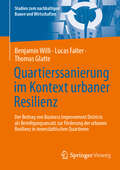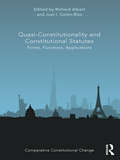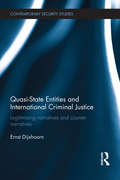- Table View
- List View
Quarterlife: A Novel
by Devika Rege“A superb read . . . both moving and inspiring.” —Jeet Thayil, author of Narcopolis Quarterlife is a groundbreaking portrait of a nation on the cusp of a new age. A group of young people converge in Mumbai after an election brings the divisive Bharat Party to power: Naren, a jaded Wall Street consultant lured home by the promise of “better days,” is accompanied by Amanda, a restless New Englander eager to live her ideals through a social impact fellowship in a slum. Meanwhile, Naren’s brother Rohit, the charismatic talent scout, sets out to explore his roots in the countryside and falls in with the fiery young men that drive the Hindu nationalist machine. As they each come to grips with the new India, their journeys coalesce into a riveting milieu characterized by brutal debates and desires as fraught as they are compulsive. The result is an ever-widening chorus that feeds into a festive night when all of Mumbai is on the streets—and the simmering unrest erupts. Quarterlife is as sweeping as it is intimate. With grace and precision, Devika Rege lays bare the moral and psychological roots of political belief in a time of reckoning for democracies worldwide. No one is spared, not even the writer. An urgent and prismatic debut, Quarterlife announces Rege as an evocative new voice in fiction and an author who is unafraid to test the limits of what the novel can achieve.
Quartierssanierung im Kontext urbaner Resilienz: Der Beitrag von Business Improvement Districts als Beteiligungsansatz zur Förderung der urbanen Resilienz in innerstädtischen Quartieren (Studien zum nachhaltigen Bauen und Wirtschaften)
by Thomas Glatte Lucas Falter Benjamin WilliStädte und ihre Quartiere sind Transformationsprozessen unterworfen und stehen nach Krisen wie der Corona-Pandemie vor großen Herausforderungen. Diese Publikation aus der Reihe „Studien zum nachhaltigen Bauen und Wirtschaften” untersucht in welcher Konstellation und unter welchen Bedingungen Business Improvement Districts (BIDs) als ein Beteiligungsinstrument der Quartiersentwicklung für die Stärkung der urbanen Resilienz eingesetzt werden können. Dabei wird auch der Frage nachgegegangen wer für die Umsetzung resilienter Stadtentwicklung verantwortlich ist und was konkret in einem Quartier resilient gestaltet werden soll.
Quasi-Constitutionality and Constitutional Statutes: Forms, Functions, Applications (Comparative Constitutional Change)
by Richard Albert Joel I. Colón-RíosThis book examines the interstices among statutory enactment, constitutional convention and formal constitution in which quasi-constitutionality exists. It provides a focal resource that can serve as a point of reference for scholars interested in quasi-constitutionality as a whole, from national and transnational perspectives, expanding on its many forms, functions, and applications with recourse to comparative insights. The book is divided in three main Parts, each of them preceded by a separate critical introduction in which an informed scholar contextualizes the chapters and offers reflections on the themes they develop. The first Part, titled 'Forms', is composed of chapters that address, from a theoretical and comparative perspective, questions related to the recognition of constitutional statutes and quasi-constitutional legislation. The second Part is titled 'Functions', and contains chapters that explore the explanatory power of quasi-constitutionality in different institutional contexts. The third Part, titled 'Applications', considers the ways in which constitutional statutes and quasi-constitutionality operate in relation to particular tensions and debates present in various jurisdictions.
Quasi-state Entities and International Criminal Justice: Legitimising Narratives and Counter-Narratives (Contemporary Security Studies)
by Ernst DijxhoornThis book explores the intended and unintended impact of international criminal justice on the legitimacy of quasi-state entities (QSEs). In order to do so, the concept of ‘quasi-state entity’ is introduced to distinguish actors in statehood conflicts that aspire to statehood, and fulfil statehood functions to a greater or lesser degree, including the capacity and willingness to deploy armed force, but lack the status of sovereign statehood. This work explores the ability of QSEs to create and maintain legitimacy for their actions, institutions and statehood projects in various constituencies simultaneously. It looks at how legitimacy is a prerequisite for success of QSEs and, using critical legitimacy theory, assesses the legitimating narratives of QSEs and their statehood adversaries. The book links international criminal justice to statehood projects of QSEs and their success and legitimacy. It looks at the effects of international criminal justice on the ability to create and maintain legitimacy of QSEs, an approach that leads to new insights regarding international courts and tribunals as entities competing with states over statehood functions that increasingly have to take the legal implications of their actions into consideration. Most important, a close assessment of the legitimising narratives of QSEs, counter narratives, and the messages sent by international criminal justice with which QSEs have to deal, and their ability to overcome legitimacy crises, provides insight on QSEs and the complex processes of legitimation. This book will be of much interest to students of international criminal justice, political violence, security studies and IR.
Que de lejos parecen moscas
by Kike FerrariLa revelación literaria argentina según The Wall Street Journal. Que de lejos parecen moscas es una novela negra explosiva que se ha convertido en un fenómeno de culto, por un escrito tan talentoso como inesperado. El señor Machi es el perfecto reflejo del éxito y del desprecio. Dueño de un pequeño imperio en Argentina, hizo su fortuna bajo la dictadura militar y luego la afianzó bajo los dos primeros gobiernos de la democracia casándose con una mujer de doble apellido, hija de un terrateniente. Lo que no le impide rodearse de bellas mujeres que obedecen a todos sus caprichos. Tiene un BMW, una colección de trescientas corbatas y diez millones de dólares en el banco. La cocaína y la «pastilla azul» le permiten distraerse de las quejas de su esposa por sus infidelidades y de las debilidades de sus hijos, tan distintos a él, pero sobre todo lo ayudan a ignorar a sus muchos enemigos, a quienes él considera insectos «que de lejos parecen moscas». Hasta que un día, encuentra un cadáver en el maletero de su BMW, atado con las esposas rosas de peluche que usa con sus amantes. Y entonces empieza otra historia. Con esta novela explosiva y original, Kike Ferrari llamó la atención de la prensa internacional y conquistó a algunos de los mejores editores del mundo. Un auténtico puñetazo en la mandíbula de todos los lectores. Críticas... «Kike Ferrari es tan de verdad que parece mentira. Tan honesto que parece un farsante. Escribe desde un sitio que ya no existe, con buen juego de piernas y pegada certera.»Carlos Zanón «Que de lejos parecen moscas es muy sólida, fluye perfectamente. Y además está escrita con esta idea de que la novela negra es la nueva novela social del siglo XX.»Paco Ignacio Taibo II «Sus textos se nutren de violencia y tragedia para conseguir transmitir esa extrema sensación que se advierte cuando las cosas no tienen solución. Un escritor a seguir.»Benito Garrido, Culturamas «Ferrari es un tipo que lleva las ideas por adentro y por afuera. No las esconde. No las mezquina. Nunca las niega. De hecho, se las tatúa en la piel, para evitar traicionarse en un descuido.»Carlos Salem «Leer a Kike Ferrari y escucharlo leer en vivo es presenciar un recital de rocanrol por su potencia narrativa y el lirismo crudo y duro de sus textos.»Leo Oyola «La novela, construida mediante saltos en el tiempo y llena de hombres de negocios repulsivos, mujeres acomodadas que prefieren unos cuernos a perder el dinero de sus maridos y matones sin remordimientos, es un ataque frontal a la actual democracia argentina.»Paula Corroto, Público
Que gane el más mejor: Mérito y competencia en el Chile de hoy
by Patricio Navia Pedro Engel BeratterUna mirada crítica, aguda y remecedora a la evidente diferencia de oportunidades en nuestro país. «Con gran lucidez los autores argumentan que si el Estado cumple a cabalidad su rol de igualar las oportunidades y proveer protección social para los débiles, la competencia aflora como el sistema más justo y eficiente en la adjudicación de roles.» Nicolás Eyzaguirre, ex ministro de Hacienda «El Chile de las diferencias abrumadoras, aquel donde cuentan decisivamente los contubernios del poder, la clase y hasta la raza, aparece al desnudo en este estupendo libro de lectura imprescindible.» Fernando Villegas, columnista y escritor «Los autores dejan en evidencia que estamos lejos de la igualdad de oportunidades. Con una mirada certera y aguda, ofrecen soluciones audaces, como aumentar la competencia no sólo entre las AFP, sino incluso entre los colegios de los barrios más pobres. Es un libro para quienes buscan dirigir y comprender el país.» Patricia Politzer, periodista «Para quien tenga interés en entender la evolución reciente de la sociedad chilena, este libro es un excepcional aporte, fresco y entretenido, muy fácil de leer.» Felipe Lamarca, economista
Que no se vaya nadie sin devolver la guita
by Enrique PintiOtro libro en que Enrique Pinti con su característico humor da cuentade un momento histórico de la República Argentina. El humorista tomacríticamente la serie de hechos que se desencadenaron en nuestro país enDiciembre del 2001. A través de cada nuevo libro de Enrique Pinti podemos anticipar parte delo que va a ocurrir en la República Argentina. Y no se trata de que estemáximo monologuista tenga poderes de adivinación ni de que poseainformación secreta, sino que su análisis de la realidad pasa por unsentido que pocos poseen: el sentido común. El sentido común que no sedeja obnubilar por el deseo o la fantasía.Sobre este punto, Pinti nos aclara que nunca permitió que sus opinionesfuera arrastradas por las ideologías en boga que vaticinaban larevolución a la vuelta de la esquina. Desde hace tiempo sabe que nuestropueblo es mucho más complejo de lo que la mayoría supone. Él se ve a símismo yt a todos nostros tal cual somos, y disecciona con mano firme alos políticos que siguen con su empecinado autismo frente a estederrumbe, a este horroroso presente cartonero, a este naufragio de todala sociedad.Si observamos los cacerolazos, los escraches y los piqueteros cortandorutas, pensaríamos que figuras como Rodríguez Saa, Menem o De la Sota nopodrían ser electos ni en un pueblito perdido de la selva misionera. Sinembargo, a pesar de todo lo que vemos, continúan encabezando lasencuestas y es probable que uno de ellos sea el próximo presidente delos argentinos.Vivimos épocas de gran confusión donde casi nadie puede prever cómo seráel día de mañana, y Enrique Pinti no es una excepción. Siento lo mismoque cualquiera de nosotros, pero intenta que pensemos juntos un futuromejor para la gente. Pese a todo, en este libro logra destrañar algunosmisterios nacionales, y lo hace con un lenguaje directo, con todo elpoder de su ironía, son su legítima bronca deslenguada.Y con su compromiso de siempre.
Quebec in a Global Light: Reaching for the Common Ground (Munk Series on Global Affairs)
by Robert CalderisiTo the outside world, Quebec is Canada’s most distinctive province. To many Canadians, it has sometimes seemed the most troublesome. But, over the last quarter century, quietly but steadily, it has wrestled successfully with two of the West’s most daunting challenges: protecting national values in the face of mass immigration and striking a proper balance between economic efficiency and a sound social safety net. Quebec has also taken a lead in fighting climate change. Yet, many people – including many Quebeckers – are unaware of this progress and much remains to be done. These achievements, and the tenacity that made them possible, are rooted in centuries of adversity and struggle. In this masterful survey of the major social and economic issues facing Quebec, Robert Calderisi offers an intimate look into the sensitivities and strengths of a society that has grown accustomed to being misunderstood. In doing so, he argues that the values uniting Quebeckers – their common sense, courtesy, concern for the downtrodden, aversion to conflict, and mild form of nationalism, linked to a firm refusal to be homogenized by globalization – make them the most "Canadian" of all Canadians.
Queen
by Aimée CarterPAWN...CAPTIVE...QUEEN? Kitty Doe is a Blackcoat rebel and a former captive with a deadly connection to the most powerful and dangerous man in the country, Prime Minister Daxton Hart. Forced to masquerade as Daxton's niece, Lila Hart, Kitty has helped the Blackcoats take back the prison known as Elsewhere. But Daxton has no intention of ceding his position of privilege-or letting Kitty expose his own masquerade. Not in these United States, where each person's rank means the difference between luxury and poverty, freedom and fear...and ultimately, between life and death. To defeat the corrupt government, Kitty must expose Daxton's secret. Securing evidence will put others in jeopardy, including the boy she's loved forever and an ally she barely trusts. For months, Kitty's survival has hinged on playing a part. Now she must discover who she truly wants to be, and whether the new world she and the rebels are striving to create has a place in it for her after all.
Queen Amidala (Star Wars Episode #1)
by Jude Watson Judy BlundellThe fascinating and dangerous first-hand story of Queen Amidala, "Episode I's" young heroine, who must hide her identity and risk everything in order to save her planet and people.
Queen Anne
by Edward GreggThe reign of Queen Anne, the last Stuart monarch, was a period of significant progress for the country: Britain became a major military power on land, the union of England and Scotland created a united kingdom of Great Britain, and the economic and political basis for the Golden Age of the eighteenth century was established. However, the queen herself has received little credit for these achievements and has long been pictured as a weak and ineffectual monarch dominated by her advisers. This landmark biography of Queen Anne shatters that image and establishes her as a personality of integrity and invincible stubbornness, the central figure of her age.Praise for the earlier edition:"A thoughtful and . . . authoritative study, easily the best thing we have on the Queen. Like Anne herself, it is eminently worthy."--Angus McInnes, History"With the appearance of this volume, a generation of revision in Queen Anne studies comes to fruition."--Henry Horowitz, American Historical Review"The best kind of biography, scholarly but sympathetic, as well as highly readable."--John Kenyon, The Observer"Bold . . . startling . . . imaginative and persuasive."--G.C. Gibbs, London Review of Books
Queen Anne: The Politics of Passion
by Anne SomersetShe ascended the thrones of England, Scotland and Ireland in 1702, at age thirty-seven, Britain's last Stuart monarch, and five years later united two of her realms, England and Scotland, as a sovereign state, creating the Kingdom of Great Britain. She had a history of personal misfortune, overcoming ill health (she suffered from crippling arthritis; by the time she became Queen she was a virtual invalid) and living through seventeen miscarriages, stillbirths, and premature births in seventeen years. By the end of her comparatively short twelve-year reign, Britain had emerged as a great power; the succession of outstanding victories won by her general, John Churchill, the Duke of Marlborough, had humbled France and laid the foundations for Britain's future naval and colonial supremacy. While the Queen's military was performing dazzling exploits on the continent, her own attention--indeed her realm--rested on a more intimate conflict: the female friendship on which her happiness had for decades depended and which became for her a source of utter torment. At the core of Anne Somerset's riveting new biography, published to great acclaim in England ("Definitive"--London Evening Standard; "Wonderfully pacy and absorbing"--Daily Mail), is a portrait of this deeply emotional, complex bond between two very different women: Queen Anne--reserved, stolid, shrewd; and Sarah Churchill, Duchess of Marlborough, wife of the Queen's great general--beautiful, willful, outspoken, whose acerbic wit was equally matched by her fearsome temper. Against a fraught background--the revolution that deposed Anne's father, James II, and brought her to power . . . religious differences (she was born Protestant--her parents' conversion to Catholicism had grave implications--and she grew up so suspicious of the Roman church that she considered its doctrines "wicked and dangerous") . . . violently partisan politics (Whigs versus Tories) . . . a war with France that lasted for almost her entire reign . . . the constant threat of foreign invasion and civil war--the much-admired historian, author of Elizabeth I ("Exhilarating"--The Spectator; "Ample, stylish, eloquent"--The Washington Post Book World), tells the extraordinary story of how Sarah goaded and provoked the Queen beyond endurance, and, after the withdrawal of Anne's favor, how her replacement, Sarah's cousin, the feline Abigail Masham, became the ubiquitous royal confidante and, so Sarah whispered to growing scandal, the object of the Queen's sexual infatuation. To write this remarkably rich and passionate biography, Somerset, winner of the Elizabeth Longford Prize for Historical Biography, has made use of royal archives, parliamentary records, personal correspondence and previously unpublished material. Queen Anne is history on a large scale--a revelation of a centuries-overlooked monarch.
Queen Bess: An Unauthorized Biography of Bess Myerson
by Jennifer PrestonThis &“fascinating&” biography details the rise of the first Jewish Miss America, TV star, and political player—and the scandal that toppled her career (The New York Times). When Bess Myerson, the Bronx-born daughter of Jewish immigrants, was crowned Miss America in 1945, she was determined to break down gender barriers and be more than a beauty queen. Amid rampant anti-Semitism, she took advantage of her reign to call for an end to bigotry and hate. Then, after more than two decades as a glamorous television personality, Myerson took on corporate America, applying her celebrity as a consumer advocate to become an influential New York City political figure credited with helping elect Mayor Edward I. Koch. But behind the glittering public image, Myerson struggled with unhappy marriages. Then, in her early sixties, she found love with a much younger married man. The romance put her at the center of a political corruption scandal that led to federal charges brought by US Attorney Rudolph W. Giuliani, ending the reign of Queen Bess, New York&’s favorite daughter, after more than forty years. Award-winning investigative journalist Jennifer Preston reveals Myerson&’s fascinating life story in this engaging biography. Featuring interviews with Myerson herself and a new introduction from the author, Queen Bess remains the most comprehensive account of this ambitious and talented woman who inspired, entertained, and shocked millions.
Queen Consort: The Life of Queen Camilla
by Penny Junor“Thoroughly well-written, this is a believable portrait of a woman who did not seek publicity or a royal role but instead to support the love of her life, Prince Charles.” —Library Journal (starred review)In the first in-depth biography of Camilla—the infamous other woman who made the marriage of Britain’s Prince Charles and Princess Diana "a bit crowded"—esteemed royal biographer Penny Junor tells the unlikely and extraordinary story of the woman reviled as a pariah who, thanks to numerous twists of fate, became the popular princess consort.Few know the Windsor family as well as veteran royal biographer and journalist Penny Junor. In Queen Consort, she casts her insightful, sensitive eye on the intriguing, once widely despised, and little-known Camilla Parker Bowles, revealing in full, for the first time, the remarkable rise of a woman who was the most notorious mistress in the world.As Camilla’s marriage to Charles approached in 2005, the British public were upset at the prospect that this woman, universally reviled for wrecking the royal marriage, would one day become queen. Sensitive to public opinion, the palace announced that this would never happen; when Charles eventually acceded to the throne, Camilla would be known as the princess consort. Yet a decade later British public sentiment had changed, with a majority believing that Camilla should become queen.Junor argues that although Camilla played a central role in the darkest days of the modern monarchy—Charles and Diana’s acrimonious and scandalous split—she also played a central role in restoring the royal family’s reputation, especially that of Prince Charles. A woman with no ambition to be a princess, a duchess, or a queen, Camilla simply wanted to be with, and support, the man who has always been the love of her life. Junor contends that their marriage has reinvigorated Charles, allowing him to finally become comfortable as the heir to the British throne.
Queen Elizabeth I (SparkNotes Biography Guide)
by SparkNotesQueen Elizabeth I (SparkNotes Biography Guide) Making the reading experience fun! SparkNotes Biography Guides examine the lives of historical luminaries, from Alexander the Great to Virginia Woolf. Each biography guide includes:An examination of the historical context in which the person lived A summary of the person&’s life and achievements A glossary of important terms, people, and events An in-depth look at the key epochs in the person&’s career Study questions and essay topics A review test Suggestions for further reading Whether you&’re a student of history or just a student cramming for a history exam, SparkNotes Biography guides are a reliable, thorough, and readable resource.
Queen Elizabeth I: A Biography
by J.E. NealeA scholarly and immensely readable, award-winning biography of the monarch known as the “Virgin Queen.”This has long been considered the classic biography of the great Tudor Queen. It is one of the first works of history to receive both scholarly and popular acclaim—testimony, indeed, to both its authority and readability. It has won the James Tait Black Memorial Prize for Biography and has been translated into nine languages.Exploring every aspect of Elizabeth’s life and rule—her shrewd policies at home and abroad—Professor Neale establishes the fact that she was unique as a strong-minded, independent woman ruling in an age of exclusively masculine power.Praise for Queen Elizabeth I“Entirely delightful, witty and gallant in defense, and nothing better has been said on the side of Elizabeth, on this side of idolatry.” —New York Times“Professor Neale’s narrative is straightforward and at times brilliant. . . . A first-rate literary biography.” —New Statesman“There can be no doubt about its scholarship. . . . Merely as a tour de force the book is a remarkable performance.” —American Historical Review
Queen Elizabeth I: Life & Legacy of the Virgin Queen
by Paul KendallThe forty-four-year reign of Elizabeth I, daughter of Henry VIII and the last Tudor monarch, was considered a golden age. It saw the emergence of the great playwrights such as William Shakespeare and Christopher Marlowe, while the exploits of Sir Francis Drake and other ‘sea-dogs’ helped establish England’s position among the great maritime powers. This book looks at Elizabeth’s life through some of the many artifacts, buildings, documents and institutions that survive to this day. From the execution of her mother, Ann Boleyn, when she was just two-and-a-half-years-old, to her imprisonment on suspicion of supporting Protestant rebels, Elizabeth’s early life was a turbulent one, but her accession to the throne ushered in a period of stability. During her reign, England’s wealth and prestige grew through her patronage of seafaring privateers such as Drake, John Hawkins and Walter Raleigh. She encouraged the exploration and colonialization of North America, marking the birth of the British Empire and the establishment of British trade routes. Elizabeth was responsible for expanding the English Navy, its defeat of the Spanish Armada being considered one of England’s greatest military victories. In this magnificently illustrated book we see her birthplace at Greenwich Palace, her childhood homes, her prison in the Tower of London, the palaces she lived in, ruins of stately homes she visited, such as Gorhambury House, Kenilworth House, Upnor Castle and the Elizabethan town walls at Berwick, the many fortifications built during her reign to defend her realm, through to her final resting place in Westminster Abbey. Also found in this fascinating volume are books that she presented to her father and step-mother, Katherine Parr, with the binding embroidered by Elizabeth, her clothes, letters she wrote in her own hand, her coronation chair, her coat of arms asserting her title as Governor of the Church of England and her signature signing the death warrant of her cousin, the 4th Duke of Norfolk. This book is not just a journey back in time to the reign of Elizabeth I, but also a tour across the country to visit the sites which still evoke that golden era of the Virgin Queen.
Queen Elizabeth II For Dummies
by Stewart RossThe longest-reigning monarch in European history! If the news about Harry, William, Kate, Meghan, and the rest of the British royals has you wondering about how this latest generation of princes, princesses, dukes, and duchesses got their start, you’re not alone. Queen Elizabeth II For Dummies takes you on a fascinating journey through the life of Great Britain’s longest-serving monarch. You’ll find revealing stories about Queen Elizabeth II’s family background, her childhood, early ascension to the throne, and her role during times of national crisis and triumph. The book combines must-know facts about the monarchy with details of the remarkable woman who has held the crown for over 68 years (and counting). You’ll also read about: Where shows like The Crown stay true-to-life and where they take artistic liberties with historical fact Queen Elizabeth II’s relationship with Prince Charles, the late Prince Phillip, Princess Diana, and the thousands of famous figures she has encountered during her reign The subtle and at times controversial role of a hereditary Head of State in a democracyPerfect for anyone with an interest in the monarchy, British governance, power and society, leadership, or the resurgence of the British monarchy in popular culture, Queen Elizabeth II For Dummies is a cracking read full of trivia, secrets, and history that puts one of the most central figures of the 20th and 21st centuries in the palm of your hand.
Queen Elizabeth II and her Family: The Incredible Life of the Princess Who Became a Beloved Queen
by DKCelebrate Queen Elizabeth II and her family in this inspiring tribute to the historic life and reign of Britain&’s longest-serving monarch.For 70 years, Queen Elizabeth II showed an unwavering commitment to her country, and she will be remembered as not only Britain&’s most beloved and longest-reigning monarch, but as a symbol of pride and inspiration everywhere. This book reflects on Elizabeth&’s remarkable story, and looks at her years as princess, her war-time service, her Coronation, and her role as Queen both at home and across the world.Each page of this charming book will introduce young readers to something new and exciting about the Queen, from her love of horses to the palaces and castles she lived in. It will tell them about her relatives - the princes, princesses, dukes and duchesses that make up her family, making this a wonderful celebration of modern British history.Queen Elizabeth II and her Family has been revised to include 12 new pages that capture recent key events like the birth of Prince Louis, the Platinum Jubilee in 2022, and the Queen&’s State funeral. With full-color photographs to complement the simple, age-appropriate text, this is simply the perfect gift to commemorate Queen Elizabeth II.
Queen Elizabeth II and the Royal Family
by DKExperience the life and reign of Queen Elizabeth II and the Royal family through rare, restricted, and exclusive photos.A stunning pictorial biography of Queen Elizabeth, recounting her childhood, succession to the throne, and her dutiful service as the reigning monarch of Britain. This biography of the Queen also includes the history of the royal family and the house of Windsor, giving fascinating insights into their goings ons. Queen Elizabeth II and the Royal Family 3rd Edition features accounts of most of the royal household including the Queen and Prince Philip&’s children, grandchildren, and great-grandchildren! Inside the pages of her biography you&’ll find: • The complete history of the Kings and Queens of Scotland and England, explaining the story of succession to the throne over more than 1,000 years • Special features profile royal residences, including Buckingham Palace and Windsor Castle • Dazzling photographic galleries showcase royal regalia and artifacts • Visual timelines at the start of each chapter highlight the key milestones in the history of the monarchy For almost 70 years the Queen has been beloved and admired by the British public, the Commonwealth, heads of states, and many others. Following her ascent to the throne at the age of 27, she&’s spent her entire life in service of the public and state. This biography celebrates her life through photographs and profiles and provides the reader with insight into this remarkable woman. Teaming with dazzling galleries of royal artefacts, photographic tours, royal residences, and the Royals up close makes this the perfect book for fans of the royal family or anyone interested in the history of the British monarchy. Queen Elizabeth II and the Royal Family 3rd Edition follows the success of Queen Elizabeth II and the Royal Family 1st Edition and the 2nd Edition in celebration of her 90th birthday
Queen Elizabeth II: A Little Golden Book Biography (Little Golden Book)
by Jen ArenaHelp your little one dream big with a Little Golden Book biography about Queen Elizabeth II! The perfect introduction to nonfiction for preschoolers!This Little Golden Book about Queen Elizabeth II who sat on the throne for more than 70 years and was the longest ruling monarch of the United Kingdom is an inspiring read-aloud for young girls and boys. Look for Little Golden Book biographies about these other inspiring people:• Joe Biden• Kamala Harris• Barack Obama• Betty White• Dolly Parton• Sonia Sotomayor• Dr. Fauci • Ruth Bader Ginsburg
Queen Elizabeth II: An Oral History
by Deborah Hart Strober Gerald StroberA stunning and revelatory oral history of Queen Elizabeth II and her reign.There seems an unquenchable fascination with the British royal family on both sides of the Atlantic, borne out by the popularity of The Crown on Netflix, the spotlight on the Sussexes and Cambridges, and the media attention on the death of Prince Philip. These detailed interviews and insightful accounts range from the very early years of her reign to Prince Phillip&’s death in 2021. Covering the shocking death of her father and the adjustment required of a newly married couple as well as the turmoil of the later years and her grandchildren&’s families. This lavishly produced hardback with rarely seen color photos paints a full, detailed and sympathetic portrait of a life lived in service. Featuring interviews from diverse sources from private staff at Buckingham Palace and family friends, to international figures like Nelson Mandela, it contains a broad spectrum of views on Queen Elizabeth II—her story and her personality and how her life has intersected and impacted others.
Queen Elizabeth II: Her Story Diamond Jubilee (Wayland One Shots Ser. #5)
by John MalamThis year Queen Elizabeth II enjoys 60 glorious years as monarch with a Diamond Jubilee celebration to be held on 5th June 2012. Queen Elizabeth II, Her Story recounts the life of our Queen from her birth to present day. It is the story of a princess who became Queen and head of the Royal House of Windsor.* Birth of a Princess* The Little Princesses* Life in the Palace* Princess at War* Elizabeth becomes Queen* The Royla Family* Royal Duties* The Royal family TreeEarly photographs capture the Queen's early years and a Royal family tree place the events of her life in context.
Queen Elizabeth II: pocket GIANTS
by Victoria ArbiterAt age 25, Elizabeth II became Britain’s 40th monarch and vowed to dedicate her life to service and duty on behalf of her country. She is the constitutional monarch of 16 sovereign states, head of the 53 member Commonwealth of Nations, Supreme Governor of the Church of England, and head of the armed forces. Most notably, however, on September 9th, 2015, she became the longest reigning monarch in British history. She has consistently adapted in order to remain relevant, while devotedly upholding the age-old traditions of the monarchy.Although there have only been six British female monarchs, it cannot be argued that some of the most enlightened times in history have occurred during periods of queenship. Elizabeth I led the country through the Golden Age and Victoria ushered in the Industrial Revolution, but it is Elizabeth II who will leave the most illustrious and progressive legacy of all.
Queen Elizabeth The Queen Mother 1900-2002: The Queen Mother and Her Century
by Arthur Bousfield Garry ToffoliQueen Elizabeth, The Queen Mother 1900 - 2002 presents the life of a remarkable woman. A Canadian perspective on a sovereign who created and cultivated a special relationship with Canada, it is the portrait of a queen who always evoked passionate reactions. Whether it was the anonymous soldier who vowed "to fight for that little lady," Adolf Hitler who described her as "the most dangerous woman in Europe," or the Canadian journalist who coined the expression "the Queen Mum," the Queen Mother seldom left people unmoved.Opening with the royal tour of 1939, during which Canadians first felt her personal magnetism, Queen Elizabeth, The Queen Mother 1900 - 2002 describes Elizabeth’s background and development, relating how she made a marriage that brought her to the centre stage of public life. It traces her tender support of her shy husband, a reluctant king, shows how she began her Commonwealth role, and recalls her shock at the sudden and unexpected call to wear the Crown.Faced with the never-ending duties of a queen, Elizabeth proved capable of providing inspired leadership for a society faced with the stark prospect of destruction in a war to save the world. On the premature death of her beloved husband she became Queen Elizabeth, The Queen Mother, a role that has shaped nearly half her life, and one in which Canada has always played an important part. The authors analyze Her Majesty’s successes and failures, both public and private, against the background of a century of violent disruption, material achievement, and incredible change.
























